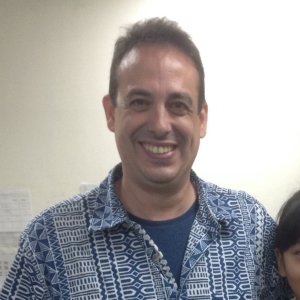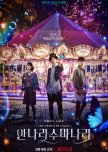Questa recensione può contenere spoiler
True Magic Is Believing in Yourself and Creating Your Own Path!
Woe to those who allow others to dictate their lives and their path. There is nothing so tragic in the world as those who allow themselves to be controlled by others. True magic—true courage—is about forging and creating your own path, no matter how many people object or attempt to destroy your hopes and dreams.
The Sound of Magic is a beautiful story, full of life, love, wisdom, and a bit of magic! True magic is believing in your Self and creating your own path. And that is the central theme of this series.
Yoon Ah Yi is a smart but struggling high school student whose life has been riddled by nothing but hardship. Her mother is gone, her father is in severe debt and stays away for long periods of time, trying one “get rich” scheme after another, leaving the adult responsibilities of taking care of her younger sister and paying the rent to Yoon Ah Yi. Her life is exhausting and non-stop, leaving little—if any time—for joy and fun. In short, Yoon Ah Yi has had to grow up very quickly, which leaves her to wonder where her childhood has gone. But soon, her imagination is awakened by the magician.
Next, we have Na II Deung, the top student at the local high school. He’s put under such pressure by his teachers and especially his parents—to do whatever it takes to be number one and to succeed academically. For those who are unfamiliar with educational pressures in Korea (as well as other Asian countries), I will say that as a TEFL teacher who worked in Korea, Taiwan, and China, the depiction of the hardships that many students have to deal with is quite realistic and true. I actually had a student tell me that his mother was so disappointed in his recent test scores that she told him, “If you can’t do any better than this, then you should just throw yourself off the balcony!” I couldn’t imagine any mother saying such a thing to her son. Most of these kids are not given any choice in how they live their lives. This is true regarding their school, university, job, and even marriage. Kids are expected to “fall in” and do what they are told to do because parents arrogantly and ignorantly, think they know best. And we see that Na II Deung is suffering immeasurably from the enormous pressures—until he meets the magician.
Ri-Eul is easily the most compelling character of the series, leaving the viewer to ask the same questions that Yoon Ah Yi and Na II Deung ask: is he really a magician? With a twinkle in his eyes, Ri-Eul simply asks, “Do you believe in magic?” As we know, children have no problem believing in any kind of magic. Their purity and innocence cause them to believe without question. As it’s stated in the wonderful movie, “The Santa Clause,” Seeing isn’t believing. Believing is seeing. It’s only when the cynical nature of adulthood sets in that magic becomes something that is silly, childish and severely mocked and frowned upon. And yet, what is life without it? Ri-Eul brings a childlike vision of the world; that just because you grow up doesn’t mean that you have to stop believing. But what makes Ri-Eul so wonderful and compelling, isn’t the tricks and magic that he uses. It’s his use of that magic to help Yoon Ah Yi and Na II Deung begin to believe in themselves. To help them realize that you don’t have to “fall in” and let others tell you how to live your life.
Of course, as with all “strange” and “outside the box” characters, the world tends to shun and persecute such people, and so Ri-Eul becomes the leading suspect in a murder investigation. It’s sad that the world always tends to view such people as “dangerous” when it’s actually the world’s fear and desire to control everyone that is truly dangerous!
There are some great songs in this fantasy series which is also a musical. And the acting performances across the board are stellar! However, it’s Ji Chang Wook’s performance as Ri-Eul that really brings it all together. Without his ability to tap into Ri-Eul’s childlike innocence, the series wouldn’t be the same. The series—like so many Korean dramas—is full of wonder, humor, wisdom, and heartfelt moments that make you introspect and ask the question: am I living the life I want? And if not, it’s never too late to start.
Robert Frost’s famous line in his poem The Road Not Taken—two roads diverged in a wood, and I took the one less traveled by. And that has made all the difference. And that is one of the core messages of this series. Na II Deung may have delivered the best line of the series when he says, “Flowers don’t grow on asphalt. They grow on bumpy, dirty roads.” So, which is the better life?
Give yourself permission to dream, to believe in magic, and most importantly, to believe in yourself. Dare to dream and to create your own path, no matter what anyone says or does. People will put you down and get upset because you’re not doing what everyone else does. This is usually a huge clue that you’re doing right by who you are. Approach the world with childlike wonder and innocence. Stop to look at all of the magic around you, whether it be a tree, a field of flowers, or a butterfly. It’s everywhere.
The world—especially our young people—are in dire need of this kind of message. When I was growing up, The Dead Poets Society was my inspirational film to help me to question what I was doing. We should all endeavor to be more like Ri-Eul—to live the life we want and not allow the world to push us down. After all, all of the magic we ever need or want is within us. Don’t be afraid to use it, and certainly don’t be afraid to believe in it.
The Sound of Magic is a beautiful story, full of life, love, wisdom, and a bit of magic! True magic is believing in your Self and creating your own path. And that is the central theme of this series.
Yoon Ah Yi is a smart but struggling high school student whose life has been riddled by nothing but hardship. Her mother is gone, her father is in severe debt and stays away for long periods of time, trying one “get rich” scheme after another, leaving the adult responsibilities of taking care of her younger sister and paying the rent to Yoon Ah Yi. Her life is exhausting and non-stop, leaving little—if any time—for joy and fun. In short, Yoon Ah Yi has had to grow up very quickly, which leaves her to wonder where her childhood has gone. But soon, her imagination is awakened by the magician.
Next, we have Na II Deung, the top student at the local high school. He’s put under such pressure by his teachers and especially his parents—to do whatever it takes to be number one and to succeed academically. For those who are unfamiliar with educational pressures in Korea (as well as other Asian countries), I will say that as a TEFL teacher who worked in Korea, Taiwan, and China, the depiction of the hardships that many students have to deal with is quite realistic and true. I actually had a student tell me that his mother was so disappointed in his recent test scores that she told him, “If you can’t do any better than this, then you should just throw yourself off the balcony!” I couldn’t imagine any mother saying such a thing to her son. Most of these kids are not given any choice in how they live their lives. This is true regarding their school, university, job, and even marriage. Kids are expected to “fall in” and do what they are told to do because parents arrogantly and ignorantly, think they know best. And we see that Na II Deung is suffering immeasurably from the enormous pressures—until he meets the magician.
Ri-Eul is easily the most compelling character of the series, leaving the viewer to ask the same questions that Yoon Ah Yi and Na II Deung ask: is he really a magician? With a twinkle in his eyes, Ri-Eul simply asks, “Do you believe in magic?” As we know, children have no problem believing in any kind of magic. Their purity and innocence cause them to believe without question. As it’s stated in the wonderful movie, “The Santa Clause,” Seeing isn’t believing. Believing is seeing. It’s only when the cynical nature of adulthood sets in that magic becomes something that is silly, childish and severely mocked and frowned upon. And yet, what is life without it? Ri-Eul brings a childlike vision of the world; that just because you grow up doesn’t mean that you have to stop believing. But what makes Ri-Eul so wonderful and compelling, isn’t the tricks and magic that he uses. It’s his use of that magic to help Yoon Ah Yi and Na II Deung begin to believe in themselves. To help them realize that you don’t have to “fall in” and let others tell you how to live your life.
Of course, as with all “strange” and “outside the box” characters, the world tends to shun and persecute such people, and so Ri-Eul becomes the leading suspect in a murder investigation. It’s sad that the world always tends to view such people as “dangerous” when it’s actually the world’s fear and desire to control everyone that is truly dangerous!
There are some great songs in this fantasy series which is also a musical. And the acting performances across the board are stellar! However, it’s Ji Chang Wook’s performance as Ri-Eul that really brings it all together. Without his ability to tap into Ri-Eul’s childlike innocence, the series wouldn’t be the same. The series—like so many Korean dramas—is full of wonder, humor, wisdom, and heartfelt moments that make you introspect and ask the question: am I living the life I want? And if not, it’s never too late to start.
Robert Frost’s famous line in his poem The Road Not Taken—two roads diverged in a wood, and I took the one less traveled by. And that has made all the difference. And that is one of the core messages of this series. Na II Deung may have delivered the best line of the series when he says, “Flowers don’t grow on asphalt. They grow on bumpy, dirty roads.” So, which is the better life?
Give yourself permission to dream, to believe in magic, and most importantly, to believe in yourself. Dare to dream and to create your own path, no matter what anyone says or does. People will put you down and get upset because you’re not doing what everyone else does. This is usually a huge clue that you’re doing right by who you are. Approach the world with childlike wonder and innocence. Stop to look at all of the magic around you, whether it be a tree, a field of flowers, or a butterfly. It’s everywhere.
The world—especially our young people—are in dire need of this kind of message. When I was growing up, The Dead Poets Society was my inspirational film to help me to question what I was doing. We should all endeavor to be more like Ri-Eul—to live the life we want and not allow the world to push us down. After all, all of the magic we ever need or want is within us. Don’t be afraid to use it, and certainly don’t be afraid to believe in it.
Questa recensione ti è stata utile?


 1
1













